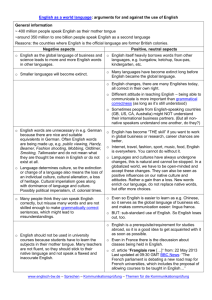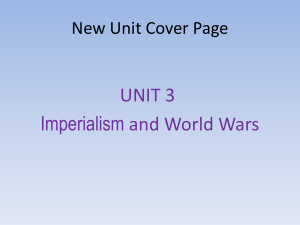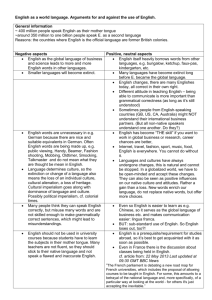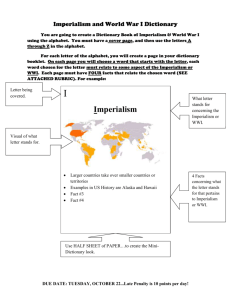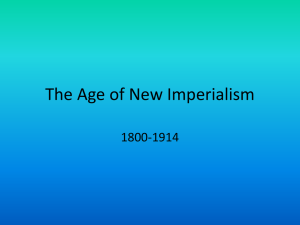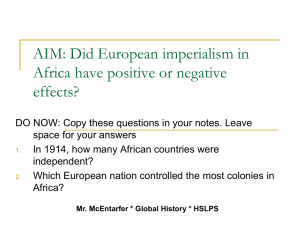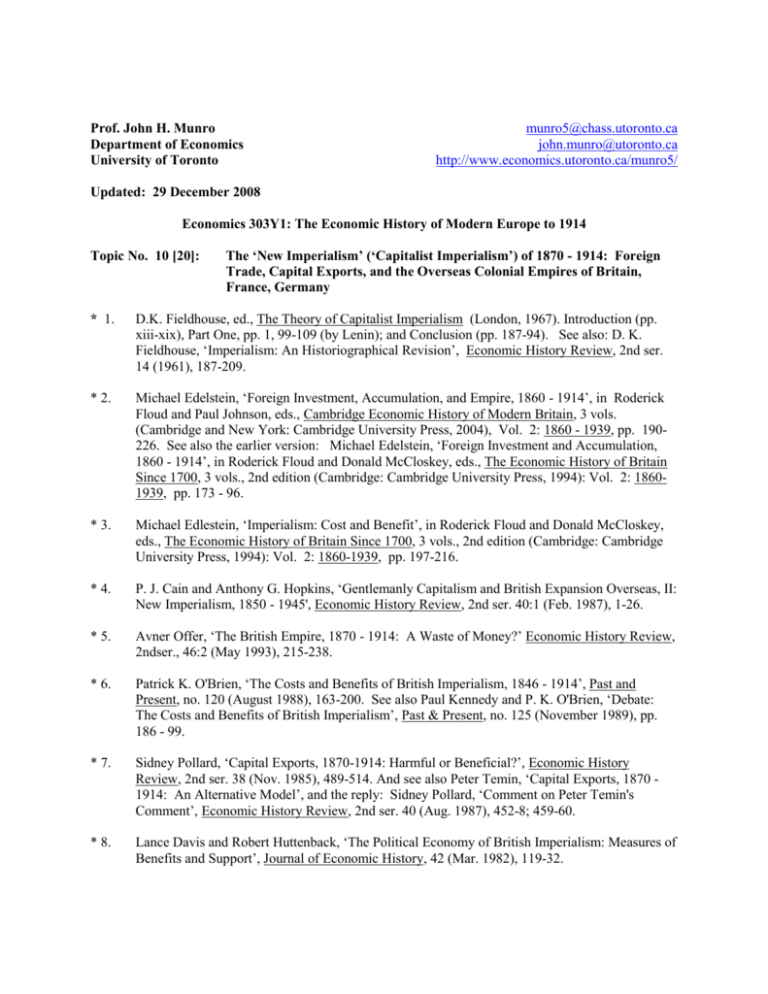
Prof. John H. Munro
Department of Economics
University of Toronto
munro5@chass.utoronto.ca
john.munro@utoronto.ca
http://www.economics.utoronto.ca/munro5/
Updated: 29 December 2008
Economics 303Y1: The Economic History of Modern Europe to 1914
Topic No. 10 [20]:
The ‘New Imperialism’ (‘Capitalist Imperialism’) of 1870 - 1914: Foreign
Trade, Capital Exports, and the Overseas Colonial Empires of Britain,
France, Germany
* 1.
D.K. Fieldhouse, ed., The Theory of Capitalist Imperialism (London, 1967). Introduction (pp.
xiii-xix), Part One, pp. 1, 99-109 (by Lenin); and Conclusion (pp. 187-94). See also: D. K.
Fieldhouse, ‘Imperialism: An Historiographical Revision’, Economic History Review, 2nd ser.
14 (1961), 187-209.
* 2.
Michael Edelstein, ‘Foreign Investment, Accumulation, and Empire, 1860 - 1914’, in Roderick
Floud and Paul Johnson, eds., Cambridge Economic History of Modern Britain, 3 vols.
(Cambridge and New York: Cambridge University Press, 2004), Vol. 2: 1860 - 1939, pp. 190226. See also the earlier version: Michael Edelstein, ‘Foreign Investment and Accumulation,
1860 - 1914’, in Roderick Floud and Donald McCloskey, eds., The Economic History of Britain
Since 1700, 3 vols., 2nd edition (Cambridge: Cambridge University Press, 1994): Vol. 2: 18601939, pp. 173 - 96.
* 3.
Michael Edlestein, ‘Imperialism: Cost and Benefit’, in Roderick Floud and Donald McCloskey,
eds., The Economic History of Britain Since 1700, 3 vols., 2nd edition (Cambridge: Cambridge
University Press, 1994): Vol. 2: 1860-1939, pp. 197-216.
* 4.
P. J. Cain and Anthony G. Hopkins, ‘Gentlemanly Capitalism and British Expansion Overseas, II:
New Imperialism, 1850 - 1945', Economic History Review, 2nd ser. 40:1 (Feb. 1987), 1-26.
* 5.
Avner Offer, ‘The British Empire, 1870 - 1914: A Waste of Money?’ Economic History Review,
2ndser., 46:2 (May 1993), 215-238.
* 6.
Patrick K. O'Brien, ‘The Costs and Benefits of British Imperialism, 1846 - 1914’, Past and
Present, no. 120 (August 1988), 163-200. See also Paul Kennedy and P. K. O'Brien, ‘Debate:
The Costs and Benefits of British Imperialism’, Past & Present, no. 125 (November 1989), pp.
186 - 99.
* 7.
Sidney Pollard, ‘Capital Exports, 1870-1914: Harmful or Beneficial?’, Economic History
Review, 2nd ser. 38 (Nov. 1985), 489-514. And see also Peter Temin, ‘Capital Exports, 1870 1914: An Alternative Model’, and the reply: Sidney Pollard, ‘Comment on Peter Temin's
Comment’, Economic History Review, 2nd ser. 40 (Aug. 1987), 452-8; 459-60.
* 8.
Lance Davis and Robert Huttenback, ‘The Political Economy of British Imperialism: Measures of
Benefits and Support’, Journal of Economic History, 42 (Mar. 1982), 119-32.
9.
Trish Kelly, ‘Ability and Willingness to Pay in the Age of Pax Britannica, 1890 - 1914',
Explorations in Economic History, 35:1 (January 1998), 31-58.
10.
David Cannadine, ‘Review Article: The Empire Strikes Back’, Past & Present, no. 147 (May
1995), pp. 180-94. A review of the publications on Imperialism by Cain and Hopkins.
11.
Martin Daunton, ‘Britain’s Imperial Economy: a Review Article’, Journal of Economic History,
61:2 (June 2001), 476-85.
* 12.
Niall Ferguson and Moritz Schularick, ‘The Empire Effect: The Determinants of Country Risk in
the First Age of Globalization, 1880 - 1913’, Journal of Economic History, 66:2 (June 2006),
283-312.
13.
Gerald Krozewski, ‘Rethinking British Imperialism’, Journal of European Economic History,
23:3 (Winter 1994), 619-30.
14.
J.R. Ward, ‘The Industrial Revolution and British Imperialism, 1750 - 1850', Economic History
Review, 2nd ser., 47:1 (February 1994), 44-65.
15.
P. L. Cottrell, British Overseas Investment in the Nineteenth Century, Studies in Economic and
Social History Series (London: MacMillan, 1975).
16.
Anthony Brewer, Marxist Theories of Imperialism: A Critical Survey (London, 1980). Read
Chapter 1, ‘Introduction’, pp. 1-26.
17.
Alan Hodgart, The Economics of European Imperialism (London, 1977).
18.
R. Owen and B. Sutcliffe, eds., Studies in the Theory of Imperialism (London, 1972): especially
Michael B. Brown, ‘A Critique of Marxist Theories of Imperialism’.
19.
Bernard Semmel, The Liberal Idea and the Demons of Empire: Theories of Imperialism from
Adam Smith to Lenin (Baltimore: Johns Hopkins Press, 1993).
* 20.
Vladimir Lenin, Imperialism: The Highest Stage of Capitalism (Moscow, 1916). A classic.
21.
Andrew Thompson, The Empire Strikes Back? The Impact of Imperialism on Britain from the
Mid-Nineteenth Century (Harlow: Pearson Longman, 2005).
N.B.
If you are going to write an essay on this topic, be sure to obtain the web document on Marxian
economics, from my Home Page, so that you may understand the terminology of the debate.
http://www.economics.utoronto.ca/munro5/MARXECON.pdf
QUESTIONS:
1.
What is ‘Imperialism’: according to Marxist and non-Marxist writers?
2.
What is the difference, if any, between the ‘Imperialism of Free Trade’ and the ‘New
Imperialism’ (or ‘Capitalist Imperialism’?). What did the exponents of Free Trade believe and
preach concerning overseas colonies and the British Empire. Was Imperialism supposed to be
inconsistent with the doctrines of Free Trade? Free Trade for whom?
3.
Why do economic historians, Marxist and non-Marxist alike, believe that a new phase of
European Imperialism commenced in the 1870s?
4.
Explain the Marxist-Leninist theory of ‘Capitalist Imperialism’, especially for the era 1870-1914.
Why did Marxists argue that advanced industrial nations necessarily exported capital, and that
such capital exports necessarily constituted or led to ‘imperialism’?
5.
Discuss the various non- or anti-Marxist theories of Imperialism concerning the era 1870-1914:
their economic and non-economic components. Whose theories are best supported by the
historical record? How do you explain the relationship, if any, among foreign trade, capital
exports, and the acquisition of overseas colonies in this era, 1870 - 1914?





